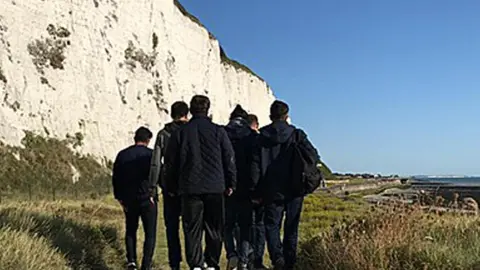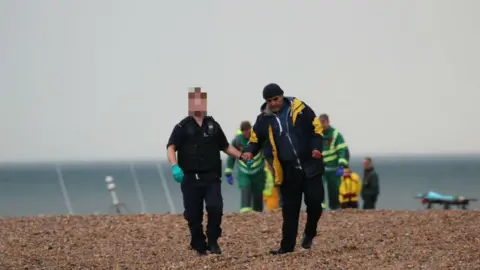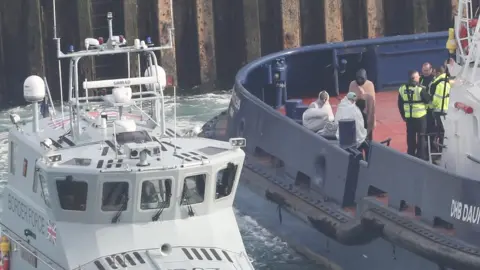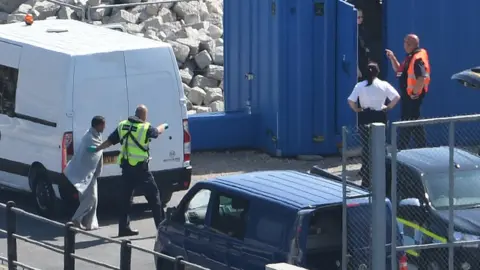Are migrants who cross the Channel sent back?
Nearly 1,900 migrants crossed the English Channel in small boats last year, prompting warnings from politicians that they would be sent back. But the figures suggest the reality is quite different.
On 22 August last year, 94 people - including at least 10 children and one baby - piled into eight small boats on a beach in northern France and set sail for England's south coast.
Thirty were rescued by the French after getting into difficulty in the middle of the world's busiest shipping lane. The remainder, like hundreds before them, slipped through the Strait of Dover and arrived in the UK.
The next day, Prime Minister Boris Johnson told anyone hoping to follow them: "We will send you back."
He added: "If you come illegally, you are an illegal migrant and, I'm afraid, the law will treat you as such."
But, while at least 1,890 foreigners reached British shores in small boats last year, the Home Office says only about 125 were returned to European countries during the same period.
In fact, experts say most of those crossing the Channel appear to have "strong" claims to asylum, with the majority hailing from Iran, according to the National Crime Agency (NCA).
"If an Iranian can reach the UK, then they have got a very good claim for asylum," said barrister Colin Yeo, who edits the immigration law website Free Movement.
"It's fairly obvious that Iran is a repressive regime, they actively persecute their citizens."
Solicitor Sheona York, an immigration and asylum specialist at the Kent Law Clinic, said adultery, homosexuality and failing to follow Islam, known as apostasy, could lead to "cruel punishments and maybe the death penalty" in Iran.
People involved in political opposition also faced "authoritarian punishments," she said.
In the year up to September 2019, 63% of Iranian nationals - equating to 2,406 people - were granted asylum on their first try, with more winning on appeal, Home Office figures show.
Studying asylum figures for Iranian nationals would "give you a pretty good idea" of what is happening to people who arrive in small boats, Mr Yeo said.
"The main problem with the harsh rhetoric you get from politicians about these people being bogus asylum seekers, and [saying] 'send them back', is that they are actually genuine refugees," he added.
Similarly, entering the country illegally is also not automatic grounds for an asylum claim to be rejected.
Mr Yeo said only a "very small number" of failed asylum seekers were forcibly removed from the country.
 Getty Images
Getty Images"Some may well win their appeals and the rest of them are just stuck in the country in limbo," he said.
Unable to work legally, many of these failed asylum seekers then depend on charity handouts and "sofa surf" or are "essentially forced to work in the black market economy," he added.
He said there were "particular problems" removing people without a valid passport to Iran because the receiving state needed to agree to them being returned.
"If the Iranian authorities aren't interested in doing that, then the UK can't make them."
Authorities have repeatedly warned of the perils of attempting to cross the Channel. It claimed at least one life last year. However, this is not putting off many Iranians from trying.
 Susan Pilcher
Susan PilcherThe number of Iranians applying for asylum in the UK rose by 79% to 4,749 in the year up to September 2019, the Home Office says. A significant proportion are thought to have crossed the Channel in small boats.
Charities suspect the high number of Iranians getting into boats is largely explained by their relative wealth compared with other migrants - they can afford to pay smuggling gangs for a place on a vessel.
Their high chance of being granted asylum means there is little incentive for them to attempt to slip into the country undetected.
In contrast, migrants attempting to stow away in lorries and container ships are typically looking to avoid the authorities and "work illegally in the UK's shadow economy," according to Border Force.
Of the so-called "clandestine entrants" discovered at British ports, the BBC has learnt that Albanians are the most common, but with a "grant rate" of just 19% they have on average one of the lowest chances of asylum success.
Shadow home secretary Dianne Abbott said the government's rhetoric on migration was "misleading the public".
"The government's own system indicates that recent asylum applications from Iranians are mostly valid; people making these dangerous journeys in small boats are likely to be genuine refugees," she said.
Bridget Chapman, from Kent Refugee Action Network, said she worked with many asylum seekers arriving by boat.
 Getty Images
Getty Images Getty Images
Getty ImagesShe said the government's "very tough talk" did not "take account of international law" and cited the UN's 1951 Refugee Convention which states "refugees should not be penalised for their illegal entry".
No 10 declined to comment when approached by the BBC.
The Home Office has however repeatedly stated that it is an "established principle that those in need of protection should claim asylum in the first safe country they reach".
It said it considered all cases on their individual merit and would continue to implement returns "as quickly as possible under international law".
But Mr Yeo said passing through a safe country like France without seeking refuge does not disqualify someone from being granted asylum in the UK.
Experts say migrants' exact reasons for making the dangerous crossing, rather than claiming asylum in mainland Europe, vary from person to person.
Some are seeking to join family members in the UK, while others are simply looking to settle in an English-speaking country, Mr Yeo said. The NCA, meanwhile, said some were motivated by the opportunity to "join a thriving Iranian diaspora" in the UK.
Many migrants reportedly refuse to be picked up by French authorities for fear of being returned to mainland Europe.
The Immigration Services Union has said some even "put their lives at risk rather than agree to be rescued" by threatening to jump from their boats.
If they reach UK waters, they are typically picked up by Border Force shortly after and are then taken ashore.
Once there, the figures suggest they have a high chance of being granted permission to stay.

What happens when migrants arrive?
The majority of boats are intercepted in the Channel by Border Force and taken to the Port of Dover, where Home Office staff begin screening migrants in a shipping container.
From there, it is likely they will be held at the Kent Intake Unit, near the car ferry terminal, where they can make an asylum claim and have an initial interview before being released.
Adults will be sent to hostel-style accommodation across the country, paid for by the government and provided by private contractors.
Unaccompanied children are usually taken into the care of Kent County Council. Boys aged under 16 and all girls are sent to foster care or a dedicated care home. Boys aged 16 or 17 are sent to the Milbank reception centre in Ashford for about two months, before going to "semi-supported" shared accommodation.
Asylum seekers are given £37.75 per week for essentials like food, clothes and toiletries while they wait for a decision.
Earlier this year the Home Office dropped its target to deal with most asylum claims within six months. The Migration Observatory says that only 25% now learn their fate in that time.


There are more facts about this topic and the wider debate around controlling or encouraging more people to our shores in our new BBC Briefing online guide to immigration, which you can download here (11.3MB).

